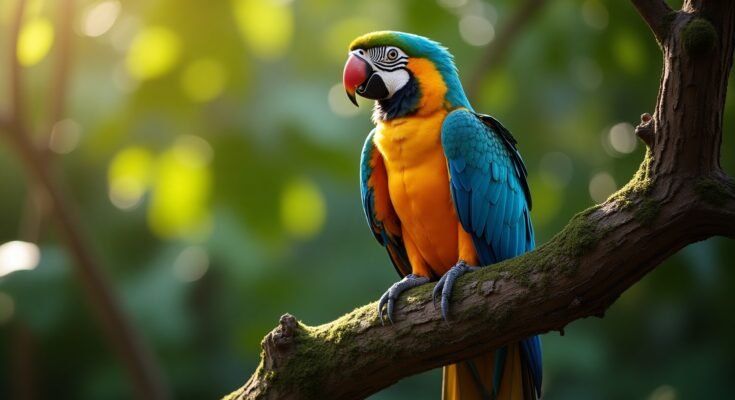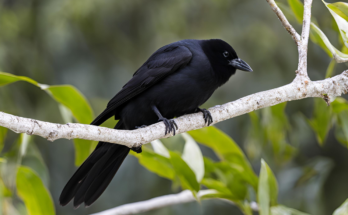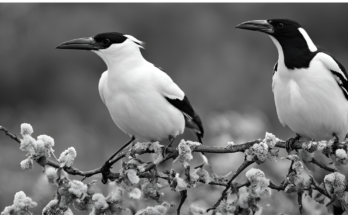Introduction
A Harlequin Macaw emerges as an intelligent hybrid parrot by letting the Blue and Gold Macaw breed with the Green-Winged Macaw. The bird represents a popular companion pet because of its colorful appearance along with its amiable qualities and capability to talk. A guide to Harlequin Macaw care is vital for potential owners because it covers their diet requirements alongside temperament characteristics and training methods and discusses their health needs.
Expert Insight
Dr. Emily Carter, an avian specialist, states that Harlequin Macaws possess highly balanced traits between intelligent behavior and affectionate disposition, thus making them perfect pets for bird owners with extensive experience and the capacity to fulfill their intense social requirements.
What is a Harlequin Macaw?
Origin and History
A Harlequin Macaw exists as a hybrid between pure wild macaw species since it did not naturally form in its original habitat. The combination of pure macaws during breeding produces the Harlequin bird.
- Blue and Gold Macaw (Ara ararauna) – Known for its playful nature and vibrant yellow-blue plumage.
- Green-Winged Macaw (Ara chloropterus) – Famous for its calm and affectionate personality with red and green feathers.
Through the union of its parent macaws, the Harlequin Macaw becomes a charming knowledge-seeking bird with distinctive colors that win favor from bird admirers. Harlequins developed through human breeding demonstrate high adaptability to people making them excellent pets when their caregiver provides suitable care.
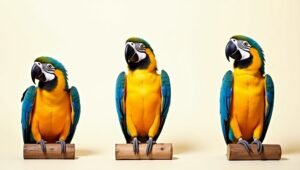
Physical Appearance
- Size: 35-40 inches long
- Weight: 2-3.5 pounds
- Lifespan: 50-80 years
- The combination of genes from parent birds determines Harlequins display red, orange, green, and blue colors.
- Wingspan: About 40 inches
A Harlequin Macaw displays individual color combinations because its genetics receive dominant traits from its parents. The coloring of the results from a genetic mix of the blue and green Blue and Gold Macaw sections with the red-orange features of the Green-Winged Macaw.
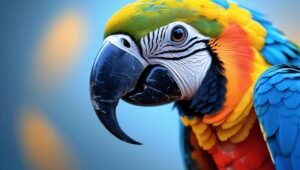
Temperament and Personality
Are Harlequin Macaws Good Pets?
Yes! A committed owner is essential for owning such birds. The main characteristics which define Harlequin Macaw’s personality include the following:
- Harlequin Macaws have social natures since they seek human interaction and desire friendship.
- This bird shows understanding abilities so it learns commands while its vocalization consists of between 15 and 20 specific words or expressions.
- These birds possess a mischievous personality which is displayed through play activities together with dancing abilities and sound-imitated behavior.
- A Harlequin Macaw makes strong emotional attachments to its owners when they want physical touch and social engagement.
- The morning and evening screeching of these birds makes them inappropriate for apartment living.
- Unsupervised Harlequin Macaws become curious mischief-makers because they love to investigate their environment.
Do Harlequin Macaws Get Along with Other Pets?
- A properly socialized Harlequin Macaw can share its cage with other macaws or parrots when it comes to cohabitating with birds.
- The relationship between Harlequin Macaws and cats and dogs requires careful treatment. Due to their robust beaks, they successfully protect themselves from potential threats. Maintain peaceful relationships with properly trained pets but need constant monitoring in these situations.
Speech and Vocalizations
- Harlequin Macaws have a strong habit of voicing their opinions through speaking and sound imitation.
- After repeatedly hearing words and phrases they can memorize a maximum of 15-20 different statements through attentive practice sessions.
- Their loud vocalizations happen daily since they enjoy being heard even though they typically request attention frequently.
- The bird can imitate various common domestic sounds such as doorbells and alarms together with human laughter.
Early training has the ability to make your Harlequin Macaw talk with you since it teaches them to respond to everyday words such as “Hello!” or “Good morning!”
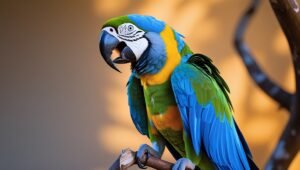
Caring for a Harlequin Macaw
Cage Requirements
Harlequin Macaws require extensive cages because of their large body size.
- Minimum Size: 5 feet x 5 feet x 8 feet
- Bar Spacing: 1 to 1.5 inches
- Different perches should be included in the cage setup to maintain healthy feet.
- Children require three types of toys: climbing ropes together with chewable wood and puzzle toys.
- Enough cleaning practices should be conducted at least weekly to stop cross-infections from occurring.
Exercise and Playtime
The Harlequin Macaw needs to spend no less than 3-4 hours outside its cage every day. This helps with:
- Mental stimulation – Prevents boredom and destructive behavior.
- Challenging physical activities maintain their health condition while stopping obesity development.
- Their bond deepens as these pets form connections with owners at senior age.
Give your Harlequin Macaw a secure playstand so it can exercise while flying and climbing as a method to stay physically active.
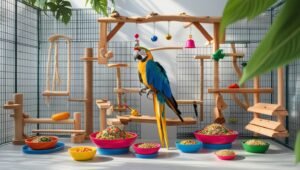
Final Thoughts
A Harlequin Macaw makes an excellent family pet due to its smart nature and affectionate behavior yet demands lots of time alongside spacious environments and continuous care. Before getting a Harlequin Macaw consider these four questions: Do you have enough time for daily contact? Is loud noise tolerable to you? Are you willing to commit to at least fifty years? And do you have the funds necessary for Harlequin Macaw ownership?
Any individual answering affirmatively about this should consider adopting a Harlequin Macaw for lifelong friendship.
FAQs
1. Do Harlequin Macaws serve as suitable pets for starting bird owners?
People who choose to own these birds should be experienced owners since Harlequin Macaws needs constant human interaction combined with training along with daily dedication to their care. Despite their requirements for experienced owners, they become manageable under dedicated research and ownership obligations.
2. Under proper care Harlequin Macaws can survive from fifty to eighty years.
These birds have a life expectancy between 50 to 80 years with appropriate care which means any owner must be prepared for a long-term responsibility.
3. Do Harlequin Macaws talk?
Yes! Harlequin Macaws possess the capacity to learn between 15-20 different words in addition to displaying sound and speech talents.
4. How much do Harlequin Macaws cost?
Harlequin Macaw owners need to budget between $3,500 to $5,000 when purchasing from hand-tamed breeders depending on their setup.
5. What should I feed my Harlequin Macaw?
The proper diet for Harlequin Macaws should include pellets together with seeds and both fresh fruits and vegetables along with nuts. The diet of Harlequin Macaws should avoid foods that include avocado, chocolate, or caffeine substances.
6. Do Harlequin Macaws get along with other pets?
Early socialization allows Harlequins to live peacefully with other birds yet they should avoid contact with cats and dogs due to their forceful beak structure.
7. The required living space for a Harlequin Macaw measures how much.
A Harlequin Macaw needs a big cage sized at a minimum of 5x5x8 feet together with at least three to four hours of daily free time outside its cage.
8. Are Harlequin Macaws noisy?
Harlequin Macaws produce excessive sound primarily during their active times in the morning and evening hours. The loud sounds produced by these birds make them unsuitable choices for residents of apartments.
9. The training process for a Harlequin Macaw consists of what steps?
You should teach tricks words and commands to your Harlequin Macaw by giving positive reinforcement combined with treats and repetition. Getting proper socialization experience in the first years of life stands as a vital requirement.
10. The best resources for Harlequin Macaw ownership or adoption include which facilities and stores?
Reputable sources to consider for acquiring an Harlequin Macaw include both breeders or rescues that specialize in exotic pet ownership or adoption. The bird must be both healthy and obtained from ethical breeding practices before purchase.
